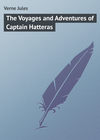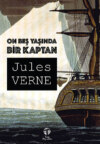Kitabı oku: «The Voyages and Adventures of Captain Hatteras», sayfa 13
CHAPTER XXVII
THE GREAT COLD AT CHRISTMAS
For a moment he had a feeling of despair. The thought of death, and death by cold, appeared in all its horror; this last piece of coal burned with an ominous splutter; the fire seemed about to go out, and the temperature of the room fell noticeably. But Johnson went to get some of the new fuel which the marine animals had furnished to them, and with it he filled the stove; he added to it some tow filled with frozen oil, and soon obtained sufficient heat. The odor was almost unendurable; but how get rid of it? They had to get used to it. Johnson agreed that his plan was defective, and that it would not be considered a success in Liverpool.
"And yet," he added, "this unpleasant smell will, perhaps, produce good results."
"What are they?" asked the carpenter.
"It will doubtless attract the bears this way, for they are fond of the smell."
"Well," continued Bell, "what is the need of having bears?"
"Bell," replied Johnson, "we can't count on seals any longer; they're gone away, and for a long time; if bears don't come in their place to supply us with their share of fuel, I don't know what is to become of us."
"True, Johnson, our fate is very uncertain; our position is a most alarming one. And if this sort of fuel gives out, I don't see how – "
"There might be another – "
"Another?" asked Bell.
"Yes, Bell! in despair on account of – but the captain would never – but yet we shall perhaps have to come to it."
And Johnson shook his head sadly, and fell to thinking gloomily. Bell did not interrupt him. He knew that the supply of fat, which it had been so hard to acquire, would only last a week, even with the strictest economy.
The boatswain was right. A great many bears, attracted by the scent, were seen to leeward of the Forward; the healthy men gave chase; but these animals are very swift of foot, and crafty enough to escape most stratagems; it was impossible to get near them, and the most skilful gunners could not hit them.
The crew of the brig was in great danger of dying from the cold; it could not withstand, for forty-eight hours, such a temperature as would exist in the common-room. Every one looked forward with terror to getting to the end of the fuel.
Now this happened December 20th, at three o'clock in the afternoon; the fire went out; the sailors, grouped about the empty stove, gazed at one another with haggard eyes. Hatteras remained without moving in his corner; the doctor, as usual, paced up and down excitedly; he did not know what was to be done.
The temperature in the room fell at once to -7°.
But if the doctor was baffled and did not know what they should turn their hands to, others knew very well. So Shandon, cold and resolute, Pen, with wrath in his eyes, and two or three of his companions, such as he could induce to accompany him, walked towards Hatteras.
"Captain!" said Shandon.
Hatteras, absorbed in his thoughts, did not hear him.
"Captain!" repeated Shandon, touching him with his hand.
Hatteras arose.
"Sir," he said.
"Captain, the fire is out."
"Well?" continued Hatteras.
"If you intend that we shall freeze to death," Shandon went on with grim irony, "we should be glad if you would tell us."
"My intention," answered Hatteras with a deep voice, "is that every man shall do his duty to the end."
"There's something superior to duty, Captain," answered his first officer, "and that is the right of self-preservation. I repeat it, we have no fire; and if this goes on, in two days not one of us will be alive."
"I have no wood," answered Hatteras, gloomily.
"Well," shouted Pen, violently, "when the wood gives out, we must go cut it where it grows!"
Hatteras grew pale with anger.
"Where is that?" he asked.
"On board," answered the sailor, insolently.
"On board!" repeated the captain, with clinched fists and sparkling eyes.
"Of course," answered Pen, "when the ship can't carry the crew, the ship ought to be burned."
At the beginning of this sentence Hatteras had grasped an axe; at its end, this axe was raised above Pen's head.
"Wretch!" he cried.
The doctor sprang in front of Pen, and thrust him back; the axe fell on the floor, making a deep gash. Johnson, Bell, and Simpson gathered around Hatteras, and seemed determined to support him. But plaintive, grievous cries arose from the berths, transformed into death-beds.
"Fire, fire!" they cried, shivering beneath their now insufficient covering.
Hatteras by a violent effort controlled himself, and after a few moments of silence, he said calmly, —
"If we destroy the ship, how shall we get back to England?"
"Sir," answered Johnson, "perhaps we can without doing any material damage burn the less important parts, the bulwarks, the nettings – "
"The small boats will be left," said Shandon; "and besides, why might we not make a smaller vessel out of what is left of the old one?"
"Never!" answered Hatteras.
"But – " interposed many of the men, shouting together.
"We have a large quantity of spirits of wine," suggested Hatteras; "burn all of that."
"All right; we'll take the spirits of wine!" answered Johnson, assuming an air of confidence which he was far from feeling.
And with the aid of long wicks, dipped into this liquid of which the pale flame licked the walls of the stove, he was able to raise the temperature of the room a few degrees.
In the following days the wind came from the south again and the thermometer rose; the snow, however, kept falling. Some of the men were able to leave the ship for the driest hours of the day; but ophthalmia and scurvy kept most of them on board; besides, neither hunting nor fishing was possible.
But this was only a respite in the fearful severity of the cold, and on the 25th, after a sudden change of wind, the frozen mercury disappeared again in the bulb of the instrument; then they had to consult the spirit-thermometer, which does not freeze even in the most intense colds.
The doctor, to his great surprise, found it marking -66°. Seldom has man been called upon to endure so low a temperature.
The ice stretched in long, dark lines upon the floor; a dense mist filled the room; the dampness fell in the form of thick snow; the men could not see one another; their extremities grew cold and blue; their heads felt as if they wore an iron band; and their thoughts grew confused and dull, as if they were half delirious. A terrible symptom was that their tongues refused to articulate a sound.
From the day the men threatened to burn the ship, Hatteras would walk for hours upon the deck, keeping watch. This wood was flesh and blood to him. Cutting a piece from it would have been like cutting off a limb. He was armed, and he kept constant guard, without minding the cold, the snow, or the ice, which stiffened his clothing as if it covered it with a granite cuirass. Duke understood him, and followed him, barking and howling.
Nevertheless, December 25th he went down into the common-room. The doctor, with all the energy he had left, went up to him and said, —
"Hatteras, we are going to die from want of fire!"
"Never!" said Hatteras, knowing very well what request he was refusing.
"We must," continued the doctor, mildly.
"Never!" repeated Hatteras more firmly; "I shall never give my consent! Whoever wishes, may disobey me."
Thus was permission given them. Johnson and Bell hastened to the deck. Hatteras heard the wood of the brig crashing under the axe, and wept.
That was Christmas Day, the great family festival in England, one specially devoted to the amusement of the children. What a painful recollection was that of the happy children gathered about the green Christmas tree! Every one recalled the huge pieces of roast meat, cut from the fattened ox, and the tarts, the mince-pies, and other luxuries so dear to the English heart! But here was nothing but suffering, despair, and wretchedness, and for the Christmas log, these pieces of a ship lost in the middle of the frigid zone!
Nevertheless, under the genial influence of the fire, the spirits and strength of the men returned; the hot tea and coffee brought great and immediate consolation, and hope is so firm a friend of man, that they even began to hope for some luckier fate. It was thus that the year 1860 passed away, the early winter of which had so interfered with Hatteras's plans.
Now it happened that this very New Year's Day was marked by an unexpected discovery. It was a little milder than the previous days had been; the doctor had resumed his studies; he was reading Sir Edward Belcher's account of his expedition in the polar regions. Suddenly, a passage which he had never noticed before filled him with astonishment; he read it over again; doubt was no longer possible.
Sir Edward Belcher states that, having come to the end of Queen's Channel, he found there many traces of the presence of men. He says: —
"There are remains of dwellings far superior to what can be attributed to the savage habits of the wandering tribes of Esquimaux. The walls are firmly placed on deep-dug foundations; the inside, covered with a thick layer of gravel, has been paved. Skeletons of moose, reindeer, and seals abound. We found coal there."
At these last words an idea occurred to the doctor; he took his book and ran to tell Hatteras.
"Coal!" shouted the captain.
"Yes, Hatteras, coal; that is to say, our preservation!"
"Coal, on this lonely shore!" continued Hatteras; "no, that's impossible!"
"How can you doubt it, Hatteras? Belcher would not have mentioned it if he had not been sure, without having seen it with his own eyes."
"Well, what then, Doctor?"
"We are not a hundred miles from the place where Belcher saw this coal! What is a journey of a hundred miles? Nothing. Longer expeditions have often been made on the ice, and with the cold as intense. Let us go after it, Captain!"
"We'll go!" said Hatteras, who had made up his mind quickly; and with his active imagination he saw the chance of safety.
Johnson was informed of the plan, of which he approved highly; he told his companions; some rejoiced, others heard of it with indifference.
"Coal on these shores!" said Wall from his sick-bed.
"We'll let them go," answered Shandon, mysteriously.
But before they had begun to make preparations for the trip, Hatteras wanted to fix the position of the Forward with the utmost exactitude. The importance of this calculation it is easy to see. Once away from the ship, it could not be found again without knowing its position precisely.
So Hatteras went up on deck; he took observations at different moments of several lunar distances, and the altitude of the principal stars. He found, however, much difficulty in doing this, for when the temperature was so low, the glass and the mirrors of the instrument were covered with a crust of ice from Hatteras's breath; more than once his eyelids were burned by touching the copper eye-pieces. Still, he was able to get very exact bases for his calculations, and he returned to the common-room to work them out. When he had finished, he raised his head with stupefaction, took his chart, marked it, and looked at the doctor.
"Well?" asked the latter.
"What was our latitude when we went into winter-quarters?"
"Our latitude was 78° 15', and the longitude 95° 35', exactly the pole of cold."
"Well," added Hatteras in a low voice, "our ice-field is drifting! We are two degrees farther north and farther west, – at least three hundred miles from your coal-supply!"
"And these poor men who know nothing about it!" cried the doctor.
"Not a word!" said Hatteras, raising his finger to his lips.
CHAPTER XXVIII
PREPARATIONS FOR DEPARTURE
Hatteras did not wish to let his crew know about this new condition of affairs. He was right. If they had known that they were being driven towards the north with irresistible force, they would have given way to despair. The doctor knew this, and approved of the captain's silence.
Hatteras had kept to himself the impressions which this discovery had caused within him. It was his first moment of joy during these long months of struggle with the hostile elements. He was one hundred and fifty miles farther north; hardly eight degrees from the Pole! But he hid his joy so well that the doctor did not even suspect it; he asked himself why Hatteras's eye shone with so unusual a lustre; but that was all, and the natural reply to this question did not enter his head.
The Forward, as it approached the Pole, had drifted away from the coal which had been seen by Sir Edward Belcher; instead of a hundred miles, it would have to be sought two hundred and fifty miles farther south. Still, after a short discussion between Hatteras and Clawbonny, they determined to make the attempt.
If Belcher was right, and his accuracy could not be doubted, they would find everything just at he had left it. Since 1853, no new expedition had visited these remote continents. Few, if any, Esquimaux are found in this latitude. The disaster which had befallen at Beechey Island could not be repeated on the shores of North Cornwall. Everything seemed to favor an excursion across the ice.
They estimated that they would be gone forty days at the outside, and preparations were made by Johnson for that time of absence.
In the first place, he saw about the sledge; it was of the shape of those used in Greenland, thirty-five inches broad and twenty-four feet long. The Esquimaux sometimes make them fifty feet long. It was built of long planks, bent at each end, and kept in position by two strong cords. This shape adapted it to resist violent shocks. The sledge ran easily upon the ice; but before the snow had hardened, it was necessary to place two vertical frames near together, and being raised in this way, it could run on without cutting too much into the snow. Besides, by rubbing it with a mixture of sulphur and snow in the Esquimaux fashion, it ran very easily.
It was drawn by six dogs; they were strong in spite of their thinness, and did not appear to be injured by the severity of the winter; the harnesses of deerskin were in good condition; perfect reliance could be placed on the equipment, which the Greenlanders at Upernavik had sold in conscience. These six animals alone could draw a weight of two thousand pounds without inordinate fatigue.
They carried with them a tent, in case it should be impossible to build a snow-house; a large sheet of mackintosh to spread over the snow, so that it should not melt at contact with their bodies; and, last of all, many coverings of wool and buffalo-skin. In addition, they carried the Halkett-boat.
Their provisions consisted of five chests of pemmican, weighing four hundred and fifty pounds; a pound of pemmican was allotted for each man and dog; of the latter there were seven, including Duke; there were to be four men. They carried, besides, twelve gallons of spirits of wine, weighing nearly a hundred and fifty pounds; tea and biscuit, in proper amounts; a little portable kitchen, with a great many wicks; and much tow, ammunition, and four double-barrelled guns. The men of the party made use of Captain Parry's invention, and wore girdles of india-rubber in which the heat of the body and the motion in walking could keep tea, coffee, and water in a liquid state.
Johnson took special care of the preparation of snow-shoes, with their wooden frames and leathern straps; they served as skates; on thoroughly frozen spots deerskin moccasins could be worn with comfort; every man carried two pairs of each.
These preparations, which were so important because the omission of a single detail might have caused the ruin of the whole expedition, required four whole days. Every day at noon Hatteras took an observation of the ship's position; it was no longer drifting, and this had to be perfectly sure in order to secure their return.
Hatteras undertook to choose the four men who were to accompany him. It was not an easy decision to take; some it was not advisable to take, but then the question of leaving them on board had also to be considered. Still, the common safety demanded the success of this trip, and the captain deemed it right to choose sure and experienced men.
Hence Shandon was left out, but not much to his regret. James Wall was too ill to go. The sick grew no worse; their treatment consisted of repeated rubbing and strong doses of lemon-juice; this was easily seen to without the presence of the doctor being essential. Hence he enrolled himself among those who should go, and no voice was raised against it. Johnson would have gladly gone with the captain in his dangerous expedition; but Hatteras drew him to one side and said to him in an affectionate, almost weeping voice, —
"Johnson, you are the only man I can trust. You are the only officer with whom I can leave the ship. I must know that you are here to keep an eye on Shandon and the others. They are kept to the ship by the winter; but who can say what plans they are not capable of forming? You shall receive my formal instructions, which shall place the command in your hands. You shall take my place. We shall be absent four or five weeks at the most, and I shall be at ease having you here where I cannot be. You need wood, Johnson. I know it! But, as much as possible, spare my ship. Do you understand, Johnson?"
"I understand, Captain," answered the old sailor, "and I will remain if you prefer it."
"Thanks!" said Hatteras, pressing the boatswain's hand; and he added, "In case we don't come back, Johnson, wait till the next thaw, and try to push on to the Pole. If the rest refuse, don't think of us, but take the Forward back to England."
"That is your wish, Captain?"
"It is," answered Hatteras.
"Your orders shall be obeyed," said Johnson, quietly.
The doctor regretted that his friend was not going to accompany him, but he was obliged to recognize the wisdom of Hatteras's plan.
His two other companions were Bell the carpenter, and Simpson. The first, who was sturdy, brave, and devoted, would be of great service in their camping in the snow; the other, although less resolute, nevertheless determined to take part in this expedition in which he might be of use as hunter and fisher.
So this detachment consisted of Hatteras, Clawbonny, Bell, Simpson, and the faithful Duke, making in all four men and seven dogs to be fed. A suitable amount of provisions was made ready.
During the early days of January the mean temperature was -33°. Hatteras waited impatiently for milder weather; he frequently consulted the barometer, but no confidence could be placed in this instrument, which in these high latitudes seems to lose some of its customary accuracy; in these regions there are many exceptions to the general laws of nature: for instance, a clear sky was not always accompanied by cold, nor did a fall of snow raise the temperature; the barometer was uncertain, as many explorers in these seas have noticed; it used to fall when the wind was from the north or east; when low it foretold fine weather; when high, rain or snow. Hence its indications could hardly be relied on.
Finally, January 5th an easterly breeze brought with it a rise in the thermometer of fifteen degrees, so that it stood at -18°. Hatteras resolved to start the next day; he could no longer endure seeing his ship torn to pieces before his eyes; the whole quarter-deck had been burned up.
So, January 6th, amid squalls of snow, the order to depart was given; the doctor gave his last words of advice to the sick; Bell and Simpson shook hands silently with their companions. Hatteras wanted to make a farewell speech to the men, but he saw nothing but angry faces around him. He fancied he saw an ironical smile playing about Shandon's lips. He held his peace. Perhaps he had a momentary pang at parting as he gazed at the Forward.
But it was too late for him to change his mind; the sledge, loaded and harnessed, was waiting on the ice; Bell was the first to move; the others followed. Johnson accompanied the travellers for a quarter of a mile; then Hatteras asked him to return, which he did after a long leave-taking. At that moment, Hatteras, turning for the last time towards the brig, saw the tops of her masts disappearing in the dark snow-clouds.




















